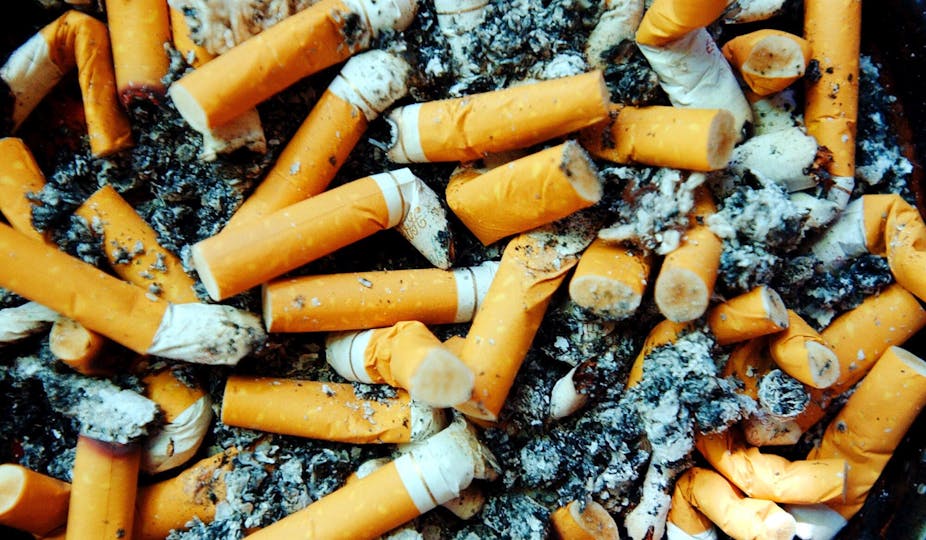Under this proposal, anyone who wanted to buy a tobacco product would need to have a licence. This wouldn’t happen overnight – we would need to identify a starting point to the scheme, which might be five years or more in the future.
The licence would be something that you would have to pay for. And if you ever wished to permanently surrender that licence you could get your money back for having done that. So that would be an incentive for people to quit.
When faced with a licence fee a lot of people would question whether they’re prepared to fork out money to allow them to continue their habit. A lot of people would say “okay, I won’t bothered with that, maybe this will finally do it for me”. Many smokers regret having started and support policies which help them quit.
We know that sort of thing happens with workplace smoking bans, we know it happens with price rises, and we know that people often refer to changes in government policy as straws which broke the camel’s back on their smoking habit.
Another feature is it would be graduated scheme, meaning you would determine in advance, whether you wanted to smoke a little bit (let’s say less than 10 cigarettes a day), a moderate amount (say 10 to 20) or heavily (between 20 and 60 – and there would be an upper limit). You would have a different licence that would enable you to buy that many cigarettes.
The other element is that any person who turned 18 and wanted to take up smoking for the first time would have to pass a smoker’s knowledge test. That would be a detailed test of the risks they were taking so they could effectively give their informed consent to smoke.
We wouldn’t require one of those knowledge tests for existing smokers because it would simply be a nightmare to administer retrospective knowledge testing of up to 3 million people.
Could people get a licence and sell the remaining cigarettes on a black market?
The most that anyone could sell – if they wanted to go to that trouble – is two or three packs a day because a maximum daily limit of say 60 would be set.
That’s not enough to live on, it’s not enough incentive for any major embrace of black market selling and it would be trivial in the overall scheme of things.
All of us who go to the doctor from time to time to get a prescription for a drug to ease pain or kill bacteria, or prevent us from getting malaria, or something like that. We effectively are given a temporary licence to consume a drug which will benefit our health.
Society has, for many years, had a system in place which says we cannot allow consumers to go into a chemist shop and say “give me a whole carton of prescription-only pain killers” or a 12 month supply of antibiotics, or something like that.
We restrict access to life-saving drugs, and health-enhancing drugs, but we allow people to go into virtually any form of retail establishment – petrol station, newsagent, corner store, supermarket – and buy an unlimited supply of tobacco products.
That reflects the historical role of tobacco as an ordinary grocery item. But this happened 90 years ago, long before the evidence demonstrated tobacco’s unprecedented danger in killing half its users.
No other product on the market remotely comes close to killing the number of people that tobacco smoking does.
What impact would this scheme have on lower socioeconomic groups?
What we know from the economic literature on price responsiveness is that low-income groups (and the lowest income group is typically teenagers and school children who only have a bit of pocket money) are very responsive to price rises.
So by extension you would reason that if a barrier was introduced, like a licence fee, that many would say, “I’m just not going to do that”. Those who really want to smoke could still choose to.
If, or when, this proposal comes to be formally examined, you could look at things like means testing the licence so that those on very low incomes would receive a proportionately reduced licence fee.
But in general, the argument which says we ought to keep the price of cigarettes low because it will harm the poor is a really perverse way of trying to help the poor because effectively, keeping the price of cigarettes low encourages smoking.
Health Minister Nicola Roxon has ruled this proposal out – how could this scheme succeed if the government won’t review it?
I’ve worked in tobacco control for 35 years and everything that was ever worth doing was never originally “on the table”.
I’ve lived through advertising bans, smoking bans in workplaces, smoking bans in restaurants, smoking bans in pubs, graphic warnings on packs, and presently, plain packaging, and every time these things came along people said “that will never happen”.
But looking back on it, it’s the most natural thing in the world to think that you don’t smoke in a restaurant now. Smoking didn’t send the restaurants broke as all the doomsayers said.
Sporting sponsorship by tobacco companies ended in 1992, the last time I looked sport was doing extremely well with other sponsors.
How is tobacco different to other consumer vices?
This is really old style thinking. They’re not the same as biscuits, confectionary or soft drink. They kill half their users when used as intended by the manufacturers.

